If you’re a dog owner, you understand the joy these furry friends bring into our lives. But like any family member, they too can develop peculiar habits that may leave us puzzled, concerned, or even downright frustrated. One such behavior you might have noticed is your dog persistently chewing or biting their nails. While it’s common for us humans to say, “Nail-biting is just a bad habit,” when it comes to our canine companions, it’s crucial to delve deeper. Nail-biting in dogs could be more than just a random behavior; it might be indicative of underlying health or emotional issues.
Whether you’ve caught your pup in the act a few times or it’s become a daily ritual, understanding the reasons behind this behavior is the first step to ensuring their well-being. Through this comprehensive guide, we aim to shed light on the common causes of dog nail biting and provide actionable strategies to help curb this habit. By the end, you’ll be armed with knowledge, tips, and solutions to keep those paws healthy and your dog happy. Let’s embark on this journey together to give our four-legged friends the care they truly deserve!

Common Causes of Dog Nail Biting
Allergies:
Just as humans can have allergic reactions, our dogs are no exception. Allergies can manifest in various ways in dogs, and one of the itchiest places can often be their paws. When dogs are exposed to certain allergens – be it from their food, pollen, mold, or even household cleaning products – their immediate reaction might be to bite at their nails or paws to find some relief.
Skin Conditions:
Sometimes, the culprit behind the nail-biting is a skin condition. Conditions like fungal or bacterial infections can make their paws unbearably itchy. If you notice any redness, swelling, or odd odors from their feet, it could very well be an infection causing all the fuss.
Parasites:
Ah, the pesky little critters! Fleas, ticks, and mites are not only bothersome but can make your dog’s life miserable. These parasites can hide between their toes, leading your dog to bite in an attempt to catch or relieve the itch from these unwelcome guests.
Anxiety and Behavioral Issues:
Just like how some humans might bite their nails when nervous, dogs can exhibit similar behavior when they feel anxious. Changes in their environment, like moving to a new home, a new family member, or even thunderstorms, can induce stress. Nail biting can be their way of coping, a sort of canine stress-relief mechanism.

Trauma or Injury:
Imagine having a tiny splinter in your foot; you’d want to remove it, right? Dogs feel the same. If they’ve stepped on something sharp, have a small cut, or even a bruise, they might chew at their nails or paws to address the discomfort.
Environmental Factors:
Winter air dries our skin out, and dogs’ paws can suffer similarly. Dry or cracked paws can be itchy or painful. In other cases, walking on hot pavements or chemically-treated grass can irritate their paws, leading to the chewing behavior.
Poor Grooming Practices:
Dogs, especially those with longer hair between their pads, can have issues if not groomed properly. Overgrown or ingrown nails, matted hair between toes, or trapped debris can all be uncomfortable, leading your dog to try and “self-groom” by biting.
Understanding our dogs isn’t always about the wagging tail or the eager barks. Sometimes, it’s about observing these subtle cues, like nail biting, and deciphering what they might be trying to tell us. Our bond with them is deepened when we take that extra step to ensure they’re comfortable and happy
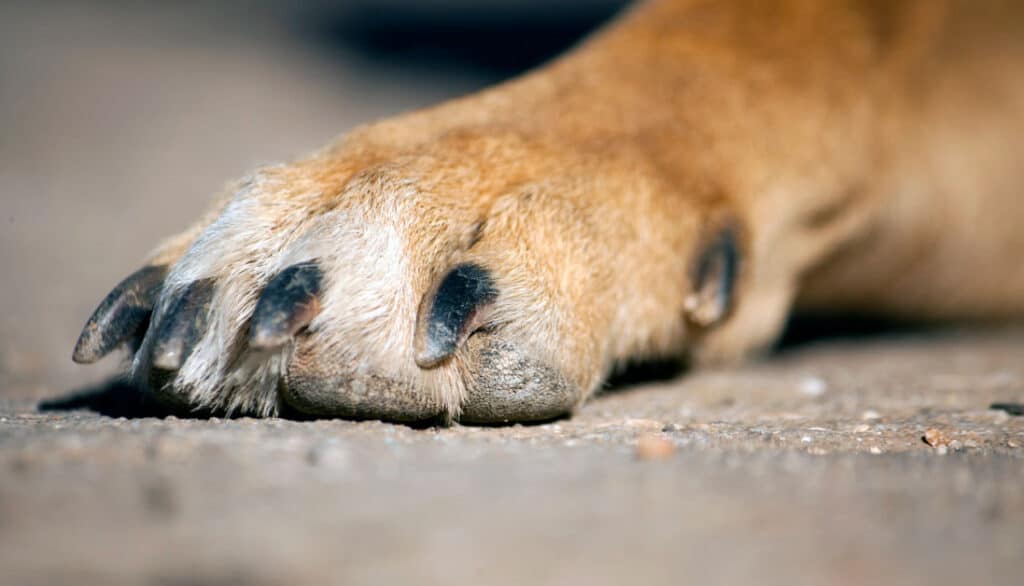
Strategies to Prevent Dog Nail Biting:
Regular Paw Checks:
Much like our occasional foot spa days, our dogs benefit from regular paw inspections. Make it a habit to gently check their paws and nails for any signs of injury, infection, or foreign objects. Not only will this keep them in tip-top shape, but it’ll also be a bonding moment. Remember, those little beans have walked miles just to be by your side!
Proper Grooming:
Setting up a grooming routine can make all the difference. Trimming your dog’s nails, cleaning between their toes, and even a soothing paw massage can deter unwanted nail biting. If you’re unsure about the right tools or techniques, consider consulting with a professional groomer or your vet. They’ll have your pup feeling and looking fabulous in no time!
Paw Protection:
Consider investing in paw balms or protectors, especially during harsh weather conditions. These products act like a moisturizer for their paws, keeping them soft and free from cracks. For those adventurous walks or during extreme temperatures, dog booties can protect their feet from rough terrains and irritants.
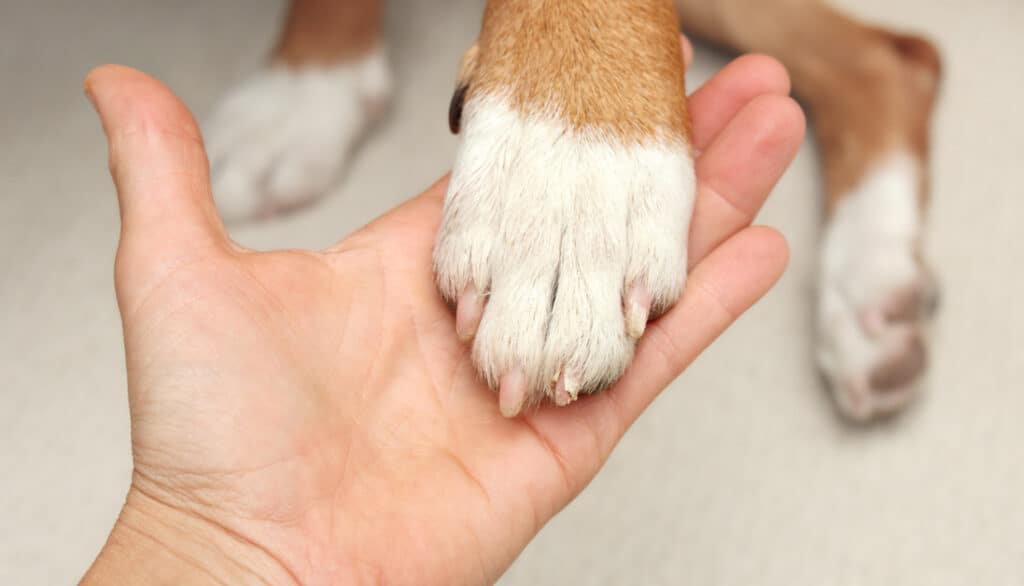
Addressing Underlying Health Issues:
If your dog’s nail biting stems from allergies or skin conditions, it’s essential to get to the root of the problem. Consult with your veterinarian for proper diagnosis and treatment. They might recommend specific ointments, medications, or even dietary changes.
Behavioral Training and Mental Stimulation:
Dogs are curious creatures, and sometimes, they just need a distraction. Toys, puzzles, and interactive games can redirect their attention from their nails to more engaging activities. If anxiety is the cause, behavioral training sessions can help them cope with stressors in a more constructive way.
Anxiety Solutions:
For those pups that get a bit anxious, consider creating a safe space or ‘den’ for them to retreat to during stressful times. Calming aids, such as anxiety wraps, diffusers with calming scents, or even gentle background music, can help soothe their nerves. Remember, a calm dog is a happy dog!
Stopping our dogs from biting their nails isn’t just about halting an unsightly habit. It’s a pledge we make to ensure their overall well-being. As we implement these strategies, it’s essential to be patient and consistent. After all, every wagging tail, contented sigh, and loving nuzzle is their way of saying, “Thanks for looking out for me!”
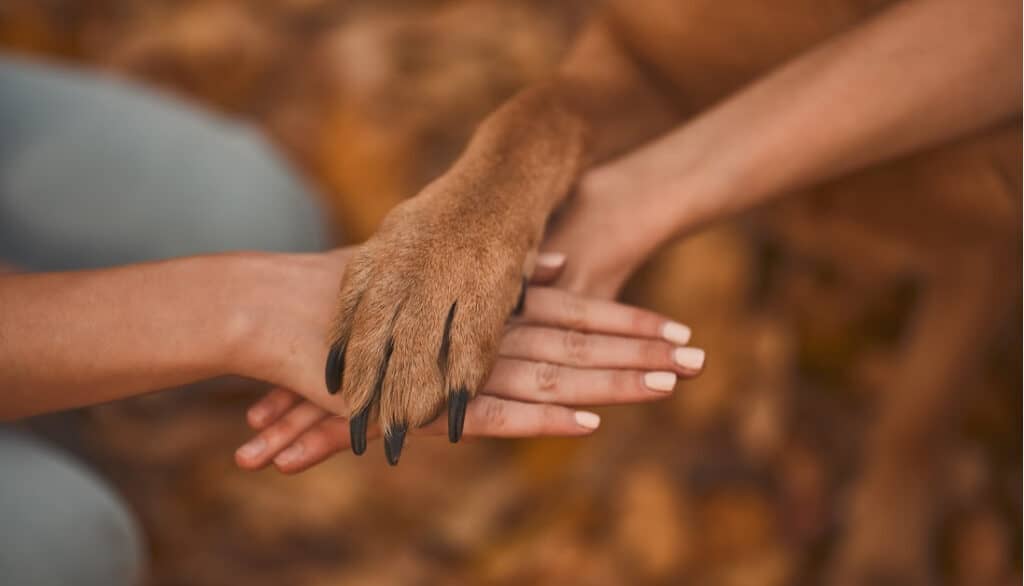
When to Consult a Veterinarian
Every dog owner knows that intuition you feel, a gut instinct, when something just isn’t right with your furry buddy. While we can address many day-to-day issues with care and attention, there are moments where professional guidance is indispensable. So, when it comes to nail biting, when should you pick up the phone and call your vet?
Persistent Issues:
If you’ve tried multiple strategies and remedies, and your dog continues to gnaw at their nails, it’s time to seek a vet’s expertise. Persistent nail biting can indicate deeper medical or behavioral issues that need addressing.
Signs of Infection or Severe Damage:
Inflamed, red, or swollen paws, oozing pus, bleeding, or any unpleasant odors emanating from their feet are urgent signs. These symptoms could indicate infections or other severe conditions that require immediate medical attention.
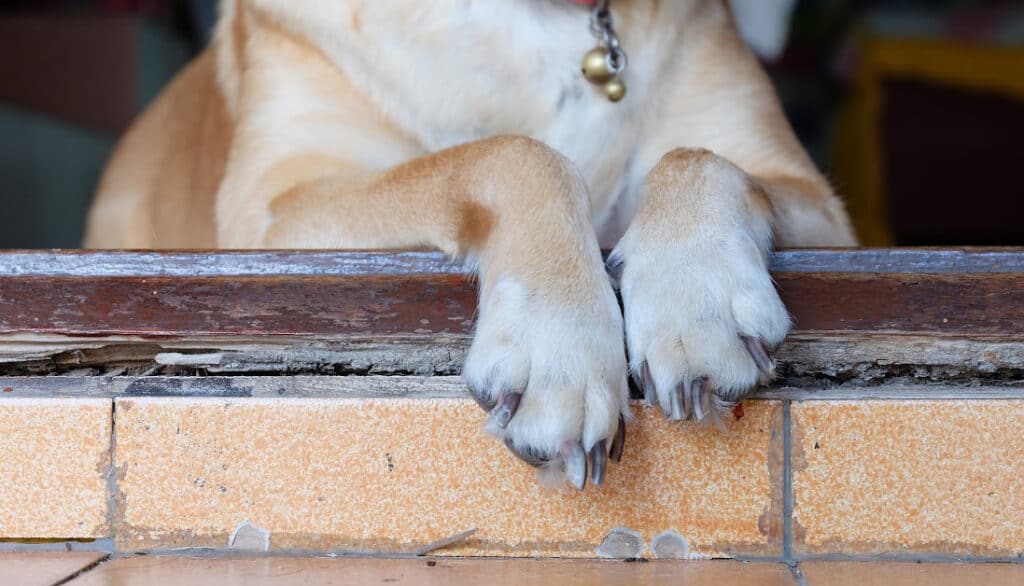
Behavioral Changes:
If your usually playful pup seems lethargic, loses appetite, or exhibits other behavioral changes along with nail biting, these could be signs of pain, discomfort, or underlying illnesses.
No Apparent Trigger:
Sometimes, dogs may start biting their nails suddenly, without any apparent external triggers like environmental changes or visible injuries. Such sudden behavioral shifts warrant a vet check-up to rule out internal or latent issues.
If You Suspect Allergies:
Allergies can manifest in myriad ways. If you’ve noticed other allergic reactions such as skin rashes, frequent ear infections, or digestive issues alongside nail biting, a vet can help diagnose and suggest appropriate treatments or dietary changes.
When it comes down to it, our dogs rely on us to be their advocates, their voice. Trusting your intuition and erring on the side of caution is always a good rule of thumb. A veterinarian won’t just provide medical solutions, but they also offer peace of mind, ensuring that your beloved canine gets the best care possible. Remember, when in doubt, reach out to a professional. Your dog might just reward you with an extra sloppy kiss for your diligent care!
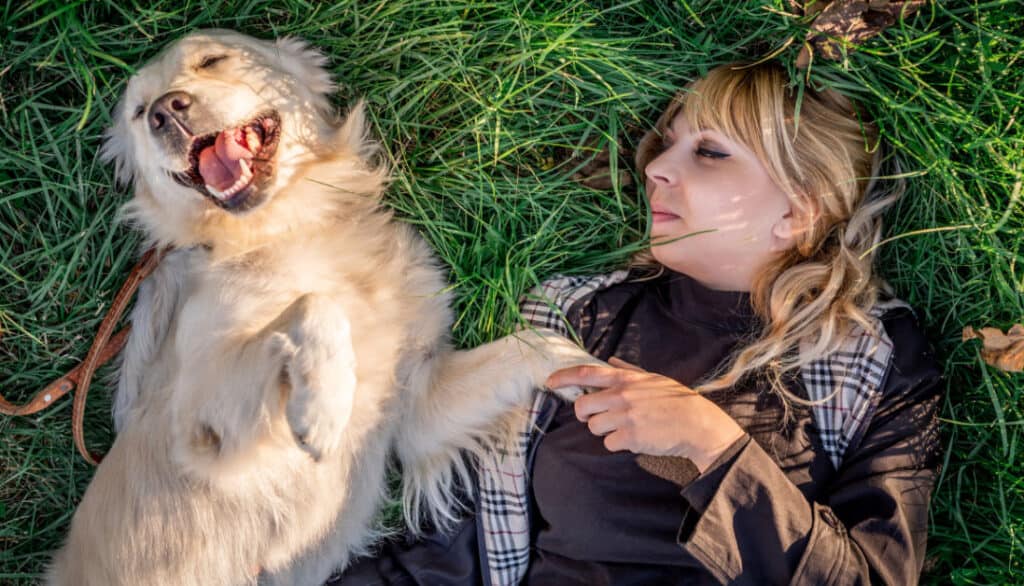
Conclusion
Navigating the labyrinth of canine behaviors can often feel like decoding a mystery. And while nail biting might seem like a minor quirk on the surface, understanding its roots and addressing the underlying causes speaks volumes about our commitment as pet parents. Our dogs, with their boundless energy, wagging tails, and adoring eyes, offer us a world filled with unconditional love and joy. In return, they ask for little – a bit of our time, attention, and understanding.
As we’ve journeyed through the reasons and remedies for dog nail biting, it’s clear that proactive care, patience, and timely interventions are the keys to unlocking healthier, happier lives for our four-legged friends. Always remember, every step you take to ensure their well-being reinforces the bond you share. Here’s to countless more days filled with playful barks, joyful jumps, and that unmistakable sound of a contented sigh as your dog curls up next to you. Because in the end, their happiness is truly our reward!
Frequently Asked Questions
Answer: If your dog is focusing on just one paw, it could indicate a localized issue, such as an injury, splinter, or even an insect bite on that specific foot. It’s essential to examine the paw closely for any visible signs of injury or irritation and consult with your veterinarian if the behavior persists.
Answer: Yes, there are several over-the-counter solutions, including anti-itch creams, paw balms, and even sprays with a bitter taste to discourage biting. However, it’s always a good idea to consult with a veterinarian before applying any product to ensure it’s safe and appropriate for your dog’s specific situation.
Answer: Behavioral nail biting often correlates with specific triggers, like changes in the environment, new family members, or other stressors. It might also happen in patterns, like during thunderstorms or when left alone. Medical-related nail biting typically appears more persistent and can be accompanied by other symptoms, such as redness, swelling, or bad odors from the paws. Observing when and how frequently your dog chews can provide clues.
Answer: Any new behavior, especially in senior dogs, warrants attention. Older dogs may develop joint pains, arthritis, or other medical issues that younger dogs might not experience. If your senior dog has suddenly taken up nail biting, it’s a good idea to consult with your vet to rule out any potential health concerns.
Answer: Absolutely! Toys can act as a great distraction and provide an alternative outlet for your dog’s chewing instinct. Ensure the toys are appropriate for your dog’s size and chewing strength, and always supervise initial play sessions to make sure they’re engaging with the toy safely.
